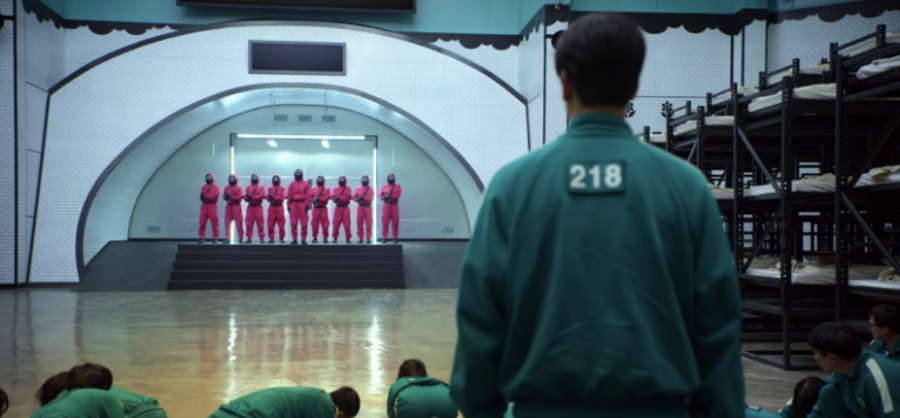Flashing lights. Multicolored balloons. Cheerleaders dancing along to a catchy song. A fluffy blue mascot. A stiffly starched man reveling in it all. And what is the crowd cheering?
“Oxy-Con-tin!”
This is a scene from Painkiller, a Netflix original drama series that depicts the rise and fall of Purdue Pharma, owned by the Sackler family – the developers and distributors of an opioid painkiller called OxyContin, and also one of the most famous Jewish philanthropic families in the world. The scene, which occurs later on in the show, shows a ridiculously over-the-top work event thrown by Purdue Pharma for its OxyContin salespeople.
The show – directed by Peter Berg and starring Matthew Broderick, Uzo Aduba, West Duchovny and Taylor Kitsch – was one of Netflix’s top ten most watched shows for 10 days straight in August of 2023, and was streamed by 7.2 million people in its first week, according to Forbes. It shows a different side of the family, juggling both campy ridiculousness and somber, exhausting realism.
The show is an exhausting watch – every episode is packed with roaring crescendos of music and action, followed by unnerving quiet. Each episode begins with a disclaimer that is read out by non-actors saying they have loved ones who have died of OxyContin overdose, and that the story has been partially fictionalized for the show.
But even fictionalized, Painkiller takes an unflinching look at the realities of addiction and the real effects of OxyContin on the people themselves.
The show is for the most part a compelling watch, with interesting and impactful performances and plot lines. However, it has a tendency to offset some of the most emotionally touching scenes with others that fall flat.
The series is divided into four storylines, each following a different character. While two of the storylines fall short of their goals, the other two follow characters who are very well drawn and emotionally impactful.
First, and most compelling, Glen Kryger, played by Taylor Kitsch, is a family man who is prescribed Oxycontin after a workplace injury and falls down a rabbit hole of addiction. Like most dramas about addiction, his story follows the pattern where the character becomes more and more addicted, trying and usually then failing to get sober.
From the moment his doctor prescribes him OxyContin for his pain, as a viewer the urge to climb into the screen and scream “Don’t do it!” is overwhelming. Kitsch’s heartbreaking performance carries most of the emotion of the show and tells a story that makes the viewer feel as if they’re watching a documentary rather than fictionalized TV.
The second storyline follows the fictional Edie Flowers, a composite character of many real investigators, who is played by Uzo Adubo. Flowers is a determined lawyer who makes it her mission to take down Purdue and the Sackler family.
Flowers’s story is full of heart, driven by a backstory of a family that struggled with addiction and feeling a very personal obligation to expose the Sackler family. In a story where nobody seems to be good, she is trying her very best.
That realism and nuance falls apart when it comes to depicting the Sackler family and the Oxycontin salespeople. Here director Berg attempts an entirely different tone. They are campy, ridiculous, greedy and grandiose, from their dialogue to the music playing in the background of their scenes.
The character of Richard Sackler, the cold CEO of Purdue Pharma and mastermind behind OxyContin, played by Matthew Broderick, is the series’ third storyline. Viewers may struggle to tell who he is, and whether the caricature-like figure shown is a plot device or a representation of the actual person.
In the show, Richard is guided by hallucinations of his uncle, Arthur Sackler, who founded Purdue, and shown sometimes as a marketing mastermind and others as an incapable baby, the ultimate symbol of greed and evil. Beyond that, his character has not been fleshed out. Whenever Sackler comes onto the screen, the music turns whimsical, the dialogue turns ridiculous. The show seems to be making fun of him.
In fact, the entire Sackler family is made out to be a greedy and argumentative group that functions only due to Richard’s leadership. In several scenes, they are shown yelling at each other and arguing until Richard silences them with his ruling. The scenes point and laugh at the family. They feel totally out of place in a show that is so somber and realistic otherwise.
The final storyline follows Shannon Schaeffer, with West Duchovny playing a young woman who is recruited to be an OxyContin saleswoman, going from doctor to doctor and encouraging them to prescribe the drug.
A bright-eyed girl who seems to be the only person at Purdue with a conscience, she doesn’t act on it until it is too late. Her scenes follow the same satirical model as the Sackler scenes, which again seem hollow compared to the Flowers or Kryger storylines.
Overall, Painkillers is a show that is trying to do opposing things. It often offsets its emotional impact, which has the potential to be quite strong, with scenes that feel emotionally empty in comparison.
Still, it holds particular relevance to Shalhevet students. The Sackler family is Jewish, and before they became infamous for their role in the opioid crisis, they were known for their philanthropy. Tel Aviv University’s medical school is the Sackler School of Medicine. The Jewish Museum in Berlin has the Sackler Staircase.
The Sackler name, as characters on the show discuss, is not one that will quickly disappear.
Especially in light of the family’s connections to the Jewish community, Painkiller is a show that, despite flaws, is a worthwhile watch for a Shalhevet student – as a cautionary tale about the dangers of addiction, as a lesson in how not to run a business and simply as an entertaining show.














